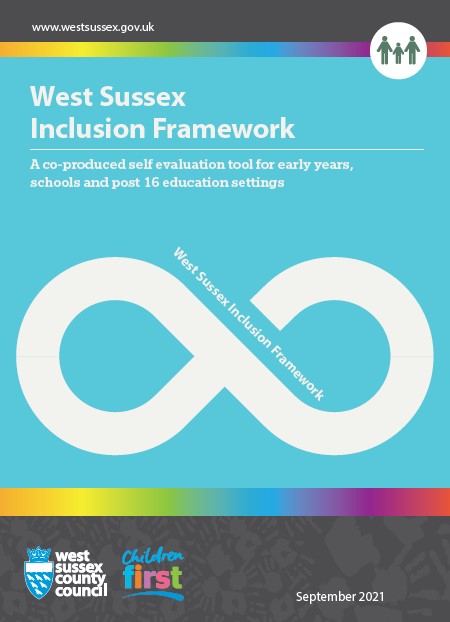
West Sussex Inclusion Framework September 2021 doc
Is there evidence that…
- Safeguarding policy is well understood and implemented by the whole school community.
- There is a strong culture of safeguarding in the school.
- Children and young people (CYP) understand, in an age appropriate way, the safeguarding procedures in place and have trust in these procedures to work in their best interests.
- All staff have a working knowledge of key policies (e.g. behaviour, safeguarding, Keeping Children Safe in Education (KCSIE)) and understand that it is good practice to question procedures.
Discussion prompts / evidence of impact
- There is a clear culture among adults that safeguarding is everyone’s responsibility and all staff understand exactly what role they play in keeping CYP safe. All staff can clearly articulate what they would do if they were worried about a CYP.
- The names of the school’s Designated Safeguard Lead (DSL) and any deputy DSL are on display across the school and are known by all staff and CYP. The pastoral team is well known and accessible to all CYP.
- All staff are attuned to subtle differences in presentation that may signal a pastoral or safeguarding concern. Staff feel equipped to listen actively and with empathy to the CYP and provide appropriate updates to the DSL when necessary.
- The DSL leads whole school safeguarding training, at least once a year, which is tailored to reflect the needs of the CYP whilst remaining in line with KCSIE.
- The child protection and safeguarding policies reflect the school’s uniqueness and provision. The policies are understood thoroughly by CYP and parents.
- Safeguarding audits or recommended self-evaluation tools are completed annually and any actions from previous years are addressed in a timely fashion.
- The nominated governor(s) regularly monitors child protection, safeguarding and health and well-being across the school. The senior leaders for behaviour, attendance and safeguarding can demonstrate that the school makes effective provision for all CYP and can describe how their role contributes to CYP’s positive outcomes.
- There are systems in place to ensure CYP feel safe. CYP report in surveys they feel safe and know what to do if they wanted to share their worries or concerns. A whole school approach to developing CYP’s’ knowledge, skill, attitudes and values related to and education for safeguarding is clearly evident. The school acknowledges the demographic within the CYP population and takes steps to ensure those in minority groups can honestly contribute their voice, in an easy and safe way.
- Members of disadvantaged groups and from the Black, Asian, Minority Ethnic (BAME) community are pro-actively supported to contribute meaningfully to surveys and CYP voice using different methodology if appropriate. It is acknowledged that their contribution, if negative or difficult for staff to read, could lead to reprisals that other CYP wouldn’t experience. This is taken into account and sensitively handled by staff collecting the data.
- A whole school approach to safeguarding is evident throughout the school ‘curriculum’. Please see West Sussex Education for Safeguarding Curriculum.
- CYP who may need Early Help, or who are at risk of harm, or have been harmed are identified swiftly and get the help they need.
- CYP who maybe Children in Need (CIN) have support from Early Help; those suffering from harm or at risk of suffering from harm are referred to Multi Agency Safeguarding Hub (MASH) in a timely fashion in accordance with safeguarding policy and procedures. All staff should be aware that mental health problems can, in some cases, be an indicator that a CYP has suffered or is at risk of suffering abuse, neglect or exploitation.
- Parents have high confidence in school safe-guarding provision. Key messages regarding safety of CYP are shared with parents.
- The views of CYP with SEND, additional needs and those from disadvantaged groups are sought by trusted professionals and these CYP also state that they feel safe. The school uses data to understand the links between attendance and attainment for all CYP.
- CYP are supported to lead risk assessment processes and take responsibility for ensuring that they are implemented safely.
- For relevant settings, there is an effective Intimate Care Policy in use for those that need support in maintaining dignity.
- Depending on setting, there is an additional touch policy outlining appropriate use of touch which is informed by the school sensory provision and is based on neuroscience evidence.
Last updated 16 August 2021
 Tools for Schools
Tools for Schools